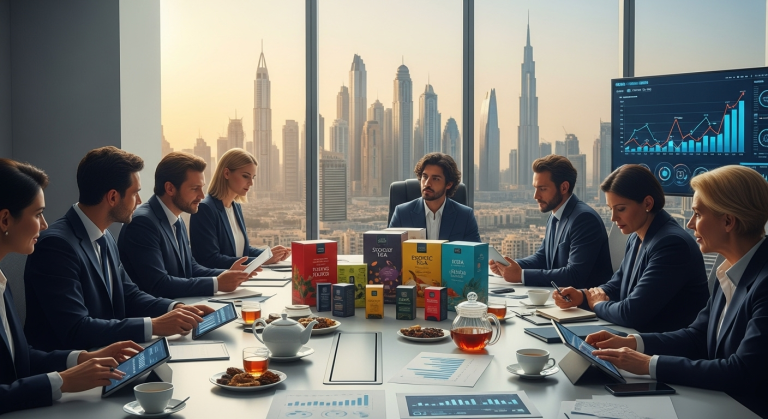Market Analysis and Opportunities
The specialty tea import and distribution sector is rapidly gaining traction in the United Arab Emirates, with Dubai standing out as a dynamic hub for international trade and consumer luxury. The popularity of high-quality, artisanal teas has grown in tandem with evolving consumer preferences, making this segment particularly attractive for entrepreneurs, investors, and business managers seeking new opportunities for business in Dubai.
Target Market Analysis
- Market Size and Growth: The UAE tea market was valued at over AED 1 billion in 2023, with forecasts anticipating a compound annual growth rate (CAGR) of 7–9% through 2028, driven by tourism, expatriate demand, and rising health awareness (Source: UAE Ministry of Economy, 2023).
- Consumer Preferences: Dubai’s multicultural population—comprising Emiratis, South Asians, Western expatriates, and tourists—has diverse tastes, valuing premium loose-leaf teas, unique blends, and wellness-centric offerings (herbal, organic).
- Purchasing Patterns: High-income consumers and younger demographics are increasingly purchasing specialty teas both online and offline. Gifting, luxury hospitality, and health trends drive demand for distinctive blends and eco-friendly packaging.
- Industry Trends:
- Digital transformation (e-commerce, mobile ordering)
- Sustainability (biodegradable packaging, fair-trade sourcing)
- Experiential retail (tea tastings, workshops)
- B2B growth (hotels, restaurants, corporate clients)
Marketing Needs
- Market Research: Ongoing consumer trend analysis, competitor benchmarking, and pricing studies are vital to refine product offerings.
- Digital Campaigns: SEO-optimized websites, PPC ads targeting “premium tea in Dubai,” and active social media presence (Instagram, Facebook, TikTok) can boost visibility among affluent and millennial consumers.
- Branding Strategies: Invest in high-end branding, influencer partnerships, and content marketing to resonate with Dubai’s luxury-oriented audience.
Expansion Potential
- Opportunities exist to grow into untapped segments such as wellness teas (detox, energy, sleep), ethnic blends, and private labeling for hospitality partners.
- Leveraging Dubai’s geographic location and logistics infrastructure can support distribution across the GCC (Saudi Arabia, Oman, Qatar) and into African and Asian markets.
- B2C expansion via direct-to-consumer online stores and B2B partnerships with hotels, cafes, and airlines extends reach and diversifies revenue.
Comprehensive Business Overview
Specialty tea import and distribution focuses on sourcing premium teas internationally and supplying them within the UAE through retail, wholesale, and digital channels. The business encompasses product curation, inbound logistics, quality control, warehousing, and distribution to a variety of clients, including cafes, hotels, retail stores, and end consumers.
- Business Model: Importer-distributor with emphasis on value-added services—curation, blending, packaging, branding, private labeling.
- Target Audience: Upscale hospitality clients (hotels, restaurants), specialty retailers, affluent consumers, health-conscious buyers, and tea connoisseurs.
- Operational Scope: Dubai-based distribution hub with reach across the UAE and GCC; leveraging Free Zone advantages for global import/export.
Mission, Vision, and Core Objectives
- Mission: To elevate the UAE’s tea experience by delivering the world’s finest specialty blends through sustainable and innovative distribution.
- Vision: To become Dubai’s leading specialty tea supplier, recognized for quality, creativity, and cultural inclusivity.
- Objectives:
- Secure exclusive import agreements with global estates
- Develop strong B2B and B2C channels
- Promote sustainability in sourcing and packaging
- Foster brand loyalty through education and engagement
Business Stage and Location
- Startups and growth-stage ventures dominate this niche, typically situated in Dubai’s Free Zones (e.g., DMCC, Dubai Airport Free Zone) for optimal import/export flexibility and 100% foreign ownership.
Competitive Advantage
Unique Value Proposition (UVP) and Key Strengths
- Entrepreneur:
- Dubai’s open trade laws and free zones enable 100% ownership, simplified setup, and low import duties.
- Proprietary blends, exclusive international partnerships, and customization options for local tastes provide differentiation.
- Ability to capitalize on rising health and wellness trends by offering organic, functional teas.
- Investor:
- Fast-growing specialty tea segment with high margins and robust demand in hospitality and retail.
- Strategic geographic location for regional and international export opportunities.
- Scalability through online sales, innovative packaging, and private labeling programs.
- Manager:
- Advanced supply chain systems, streamlined logistics via Dubai’s ports and airports.
- Multi-channel distribution (B2B, B2C, digital), responsive to market shifts.
- Strong recruitment pool and service infrastructure in Dubai to support operations.
Financial and Investment Needs
Financial Requirements
Estimated startup and operational capital for specialty tea import and distribution in Dubai ranges between AED 500,000 and AED 2 million:
- Setup and Licensing: AED 60,000–120,000 (Free Zone company formation, trade license, administrative fees)
- Inventory and Sourcing: AED 200,000–700,000 (initial inventory, supplier contracts, shipping)
- Infrastructure: AED 90,000–200,000 (office/warehouse rent, equipment, utilities)
- Staffing: AED 80,000–180,000 (salary, visa, end-of-service provisions)
- Marketing: AED 20,000–80,000 (website build, digital campaigns, branding)
- R&D and Innovation: AED 20,000–50,000 (product development, sustainable packaging)
Investment Potential
- High barriers to entry (supplier relationships, brand building) strengthen market position and long-term returns.
- Expected ROI in specialty F&B distribution is 12–18% annually, with room for higher margins via premium and organic blends.
- Suitable investment models include equity partnerships, angel investment, and venture capital for business scaling.
- Government incentives, tax-free profits, and no currency restrictions in Free Zones bolster attractiveness for investment in Dubai (Investment Consulting Services).
Financial Risks and Mitigation
- Risks: Working capital pressures from large upfront imports, foreign exchange volatility, high fixed costs.
- Mitigation:
- Negotiate flexible supplier payment terms
- Hedge forex exposure
- Diversify suppliers and customer segments
- Take insurance on shipments and inventory
- Establish legal safeguards and robust contracts
Human Resources and Recruitment
Workforce Needs
- Permanent roles: Operations manager, logistics coordinator, sales executive, quality control specialist, digital marketer.
- Specialist hires: Tea master/blender, e-commerce manager, branding strategist.
- Temporary staffing: Event promoters, warehouse assistants during peak periods.
HR Challenges
- Attracting skilled labor amid competitive F&B and retail sectors.
- Retaining top talent with competitive compensation, training, and advancement opportunities.
- Need for cultural diversity training to effectively serve Dubai’s varied population.
Compliance with UAE Labor Laws
- Strict adherence to visa, labor contracts, working hours, and end-of-service benefits is required.
- Maintain transparent employment contracts in Arabic and English.
- Engage authorized PRO services for onboarding, payroll, and compliance audits to avoid penalties and ensure smooth operations.
- Align HR policies with UAE labor law updates.
Infrastructure and Operations
Infrastructure Needs
- Physical: Office for administration (can leverage co-working spaces), temperature-controlled warehouse for bulk storage.
- Technology: Modern ERP and inventory management software, cloud-based CRM, seamless e-commerce integration for B2C sales.
Cost-Effective Solutions:
- Utilize Free Zone facilities for cost savings and simplified logistics.
- Consider third-party logistics (3PL) partners for warehousing and last-mile delivery.
Operational Optimization
- Automate stock monitoring and reorder processes to minimize shortages/overstocking.
- Streamline supply chain with real-time tracking and standardized SOPs for quality checks.
- Deploy lean management principles and digital dashboards to improve decision-making and reduce costs.
Legal Compliance
- Register with Dubai Free Zone or DED (for Mainland setups) for legal business operation.
- Obtain import/export code, food safety clearance, and necessary certifications for specialty products.
- Set up a dedicated corporate bank account for compliant financial transactions (Business Setup Services).
Innovation and Technology
- Utilize blockchain traceability for product provenance and quality assurance.
- Implement a robust e-commerce platform with integrated mobile payment and AI-driven customer engagement tools.
- Run digital product launches and virtual tasting events to engage tech-savvy consumers.
Marketing and Branding Strategies
Brand Status and Perception
- Brands entering Dubai’s specialty tea market must balance authenticity with a sophisticated visual identity to appeal to high-end consumers.
- Establish authority through educational content, community events, and storytelling about tea origins.
Optimizing Marketing Channels
- Digital marketing: Prioritize SEO for keywords like “premium tea Dubai,” paid search ads, social media storytelling, and influencer collaborations.
- Traditional marketing: Events, pop-up stores, tastings at luxury hotels, and collaborations with local cultural festivals.
360-Degree Campaigns
- Integrate email marketing, loyalty programs, and customer referral initiatives.
- Organize immersive experiences, such as virtual tea masterclasses or in-person tasting events at hotels, to foster brand loyalty.
- Leverage PR placements in industry news portals and blogs to build credibility (Blog).
Growth and Development Potential
Growth Strategies
- Pursue private label partnerships with luxury hotels and airlines seeking exclusive blends.
- Expand B2C e-commerce footprint and invest in subscription-based models for recurring revenue.
- Build strategic partnerships with UAE-based F&B distributors and gourmet grocery chains.
Networking
- Attend trade shows, F&B expos, and industry mixers to foster connections with suppliers, buyers, and government officials.
- Join business councils and leverage platforms like Persian Horizon’s services for business matchmaking, expansion advice, and regulatory support.
International Expansion
- Dubai’s status as a global logistics and trade center makes it an ideal launching pad for exports to the GCC, Africa, and Europe.
- Leverage Dubai’s world-class infrastructure, such as Jebel Ali Port and Al Maktoum Airport, for efficient regional and international distribution.
Sustainability and Innovation
- Pursue eco-friendly packaging, carbon offset partnerships, and sustainable tea sourcing to appeal to conscientious consumers.
- Develop innovative blends using locally inspired flavors to resonate with Emirati pride and culinary trends.
- Support Dubai’s Vision 2030 by aligning with green and smart city initiatives (News).
Alignment with Dubai’s Market
Cultural Alignment
- Offer blends and packaging that reflect Dubai’s diverse, multicultural society, including Arabic, Asian, and Western influences.
- Host multicultural events and educational seminars to increase brand accessibility and cultural resonance.
Local Regulatory Compliance
- Ensure strict adherence to UAE’s commercial and food safety regulations.
- Stay updated on evolving tax (VAT), labeling, and halal certification requirements.
- Proactively conduct legal audits and engage local consulting services for compliance assurance.
Leveraging Dubai’s Advantages
- Tax-free profits and simplified import/export processes in Free Zones.
- Access to global markets due to Dubai’s strategic position and advanced infrastructure.
- Government-backed innovation programs and business incubators supporting F&B startups.
- Pro-business policies attract investment and talent from around the world.
Local Challenges and Solutions
- Challenges:
- Intense competition from established global and regional brands
- High rental and operational costs
- Complex supplier logistics and fluctuating import timelines
- Solutions:
- Focus on UVP, exceptional customer service, and reliability to stand out
- Opt for scalable, asset-light models in the initial phase
- Build strong relationships with suppliers and logistics providers
- Use expert business setup guidance to navigate bureaucracy and select the optimal jurisdiction
Conclusion
The specialty tea import and distribution business holds significant promise in Dubai and the wider UAE, owed to strong economic fundamentals, booming hospitality, and cosmopolitan consumer demand. Success hinges on strategic positioning, operational excellence, investment in brand, and precise compliance with regulatory requirements. By leveraging Dubai’s infrastructure and multicultural vibrancy, entrepreneurs can build differentiated, sustainable, and high-margin businesses. Investors and managers will find this sector attractive for its growth trajectory, premium positioning, and scalability.
Call-to-Action
Ready to take advantage of Dubai business opportunities in specialty tea import and distribution? For comprehensive business setup services, market entry strategies, and investment consulting tailored to the UAE, contact Persian Horizon today. Empower your venture and join Dubai’s thriving F&B sector with expert support every step of the way.







